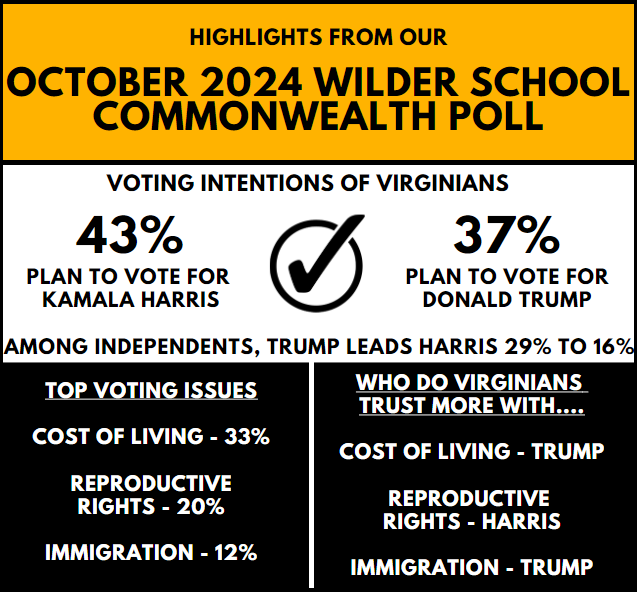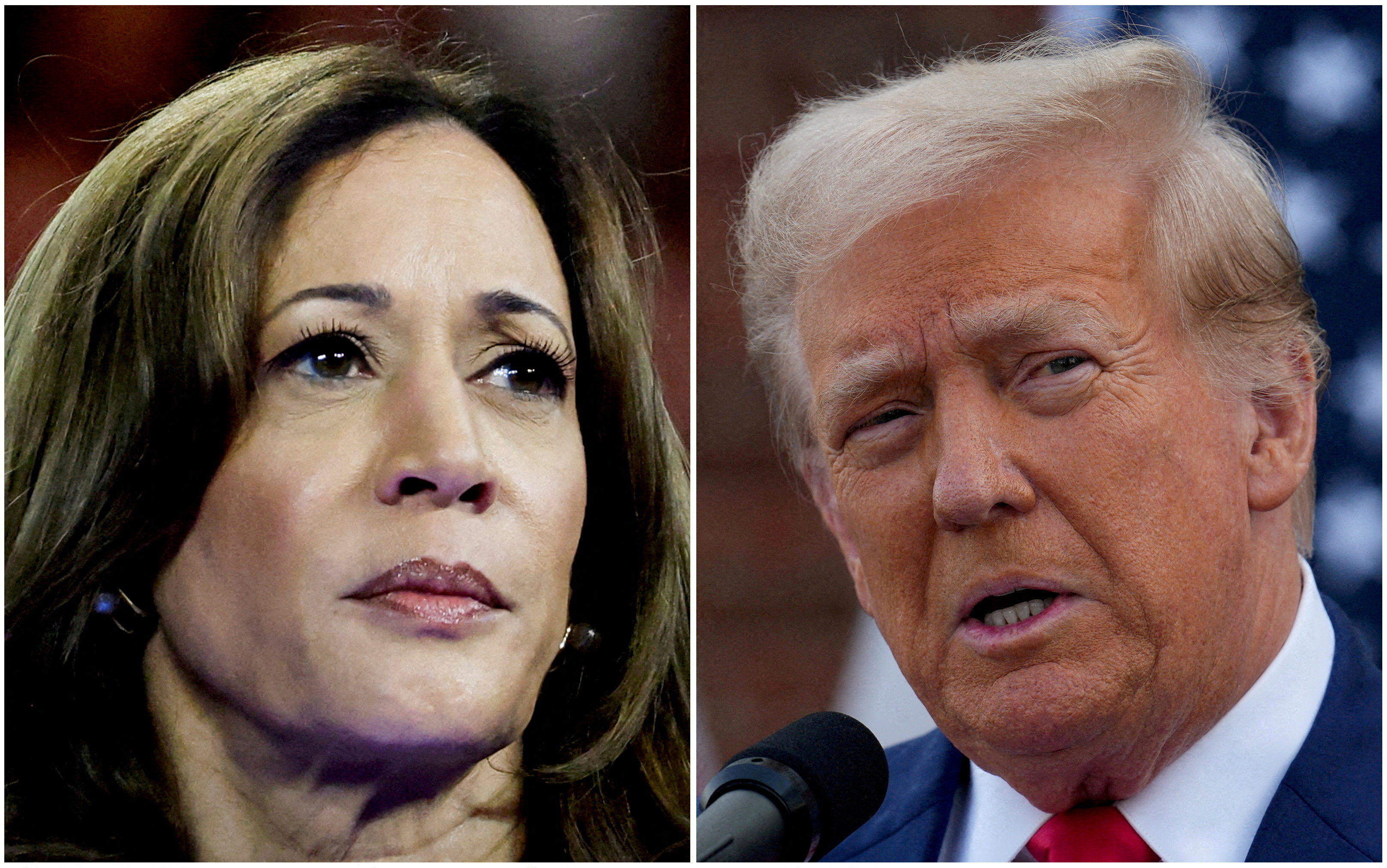Virginia Commonwealth University
FOR IMMEDIATE RELEASE
CONTACTS:
L. Douglas Wilder
Distinguished Professor
Phone: 804-827-0776
Email: ldwilder@vcu.edu
Robyn McDougle
Associate Dean of Research and Outreach
Phone: 804-721-6703
Email: rdmcdougle@vcu.edu
In the latest Commonwealth Poll from the VCU Wilder School, the cost of living remains a top concern, with voters trusting Trump more than Harris on the economy.

RICHMOND, Va. (Oct. 2, 2024) - Today, the VCU Wilder School released the results of its most recent Commonwealth Poll, conducted from Sept. 16 to Sept. 25.
With Virginians already voting in the presidential election, Democratic nominee Kamala Harris leads Republican nominee Donald Trump 43% to 37%. This is a slight dip in support compared with last month’s VCU Wilder School Commonwealth Poll, which had Harris leading Trump 46% to 36%.
By party affiliation, almost 9 of 10 Democrats (86%) said they would vote for Harris, while 79% of Republicans support Trump. Among Independents, Trump leads Harris 29% to 16%, with 16% saying they would not vote and 19% undecided. By age demographics, 18- to 24-year-olds are breaking for Harris (42% to 37%), as they were in VCU Wilder School’s previous poll in early September. Interestingly, the trend among older voters, ages 55 to 65, continuing to support Harris is seen in the new poll as well (56% to 36%).
L. Douglas Wilder, the 66th governor of Virginia, said, “The slip in the Harris lead, though not alarming, should be a wake-up call, as the sampling error of plus or minus 4.64 sends a message. Independents could make a real difference. The race in Virginia could be decided by who gets their voters to turn out, and voting has already started.”
Most important voting issues
Virginians were asked to identify the most important issue influencing their vote. The top three concerns are the rising cost of living (33%), women’s reproductive rights (20%) and immigration (12%). These priorities are consistent with VCU Wilder School polls over the summer and in early September. Among Democrats, the most important issue is women’s reproductive rights (39%). For Republicans and Independents, the top concern is the rising cost of living, with 45% of Republicans and 30% of Independents identifying it as their primary issue.
Trust with handling the economy
Voters trust Trump more than Harris on the economy (42% to 38%), compared with last month’s poll that found a virtual tie, with 38% of voters trusting Harris and 37% trusting Trump.
Among Democrats, 73% trust Harris on the economy, while 87% of Republicans and 47% of Independents trust Trump more.
“The slip in the Harris lead, though not alarming, should be a wake-up call, as the sampling error of plus or minus 4.64 sends a message. Independents could make a real difference. The race in Virginia could be decided by who gets their voters to turn out, and voting has already started.”
-L. Douglas Wilder
Trust with handling immigration issues
Virginians were also asked whom they trust the most on immigration issues. As with the economy, Trump leads Harris 42% to 38%. Among Republicans and Independents, Trump was trusted more on immigration issues (86% and 32%, respectively), while 74% of Democrats trust Harris more.
Trust with handling reproductive rights
On reproductive rights overall, Virginians trust Harris (49%) more than Trump (23%). Democrats overwhelmingly trust Harris’ handling of women’s reproductive rights (91%). Among Independents, 33% trust neither candidate, though Harris is trusted more than Trump (24% to 19%). Among Republicans, 51% trust Trump to handle women’s reproductive rights, while a quarter (25%) trust neither nominee.
Access the full results of the latest VCU Wilder School Commonwealth Poll here.
About the VCU L. Douglas Wilder School of Government and Public Affairs
Ranked in the top 15% of graduate schools of public affairs in the nation by U.S. News and World Report, No. 39 among the top 40 Graduate Schools of Public Affairs, No. 6 in Homeland Security Programs, and No. 33 in Public Management and Leadership Programs, the L. Douglas Wilder School of Government and Public Affairs at Virginia Commonwealth University advances excellence in governance and promotes evidence-based public policy in Virginia and beyond. The school offers a range of graduate, post-baccalaureate, and doctoral programs in virtually every policy area, including criminal justice, homeland security and emergency preparedness, public administration, public policy and administration, and urban and regional studies and planning. Additionally, the Wilder School is home to robust Centers and Institutes for Public Policy that provide applied research in the areas of state and local government, social equity, and leadership, offering a range of services to clients in state and local government, nonprofit organizations, businesses, and the general public. Learn more at wilder.vcu.edu.
About the VCU Wilder School Commonwealth Poll
For nearly three decades, the VCU Wilder School Commonwealth Poll within the Centers and Institutes for Public Policy has been an important bellwether for policymakers in Virginia and beyond on a range of topics, including voting intentions, economic and workforce development, education, housing, public health, public safety and racial equity. The Commonwealth Poll is a featured 2020 Presidential Election Poll by CNN, approved based on a rigorous review of methodologies and assumptions that ensure that CNN-cited polling entities are employing the gold standard in public opinion research.
Methodology
The Post-Debate 2024 Commonwealth Poll, sponsored by Virginia Commonwealth University, obtained telephone interviews with a representative sample of 832 adults, ages 18 or older, living in Virginia. Telephone interviews were conducted by landline (200) and cell phone (632, including 453 without a landline telephone). The survey was conducted by Responsive Management. Interviews were conducted in English from Sept. 16, 2024, to Sept. 25, 2024. The margin of sampling error for the complete set of weighted data is ±4.64.
In telephone survey research, design weights are often employed to reduce bias, correcting for differences in the probability of selection due to non-response and non-coverage. The sample was weighted to match Virginia’s adult population, which was the primary sampling unit. Two sampling frames were employed: one frame representing those with a listed landline and a second frame consisting of RDD cellular numbers. A two-stage weighting procedure was used to weight this dual-frame sample. Both samples were provided in their proper proportions according to state telephone type usage by Marketing Systems Group, a leader in providing research-based statistical samples. Non-productive numbers were identified via CELL-WINS, a non-intrusive real-time screening process that identifies active and inactive numbers, and were removed from the potential sample.
As many as seven attempts were made to contact every landline telephone number, and as many as five attempts were made to contact each cell phone number. Calls were made at different times of day and different days of the week to maximize the chance of contacting potential respondents. Each telephone number received at least one daytime call when necessary. In addition to the five attempted phone calls for each cell number, cell numbers that were not reachable in five attempts were sent a message via Short Message Service (SMS) with one final request to participate in the study. The SMS message contained a link that would lead the respondent to the survey. Of the 632 surveys completed with cell sample, 67 were completed using the link provided in the SMS message. For the landline sample, the computer questionnaire instructed interviewers to ask to speak with the youngest adult currently at home. Selecting respondents in this manner has been shown to result in data that closely mirror the population in terms of age when combined with Responsive Management cellular sampling. For the cellular sample type, interviews were conducted with an adult who answered the telephone. Response rates were computed according to American Association for Public Opinion Research standards[1]. Thus, the response rate for the landline sample is 7.0 percent. The response rate for the cellular sample is 9.0 percent. A two-stage weighting procedure was used to weight this dual-frame sample. Weighting was accomplished using the Anesrake package, which implements the American National Election Study (ANES) weighting algorithm.
[1] The American Association for Public Opinion Research. 2016. Standard Definitions: Final Dispositions of Case Codes and Outcome Rates for Surveys. 9th edition. AAPOR.

.jpg)

